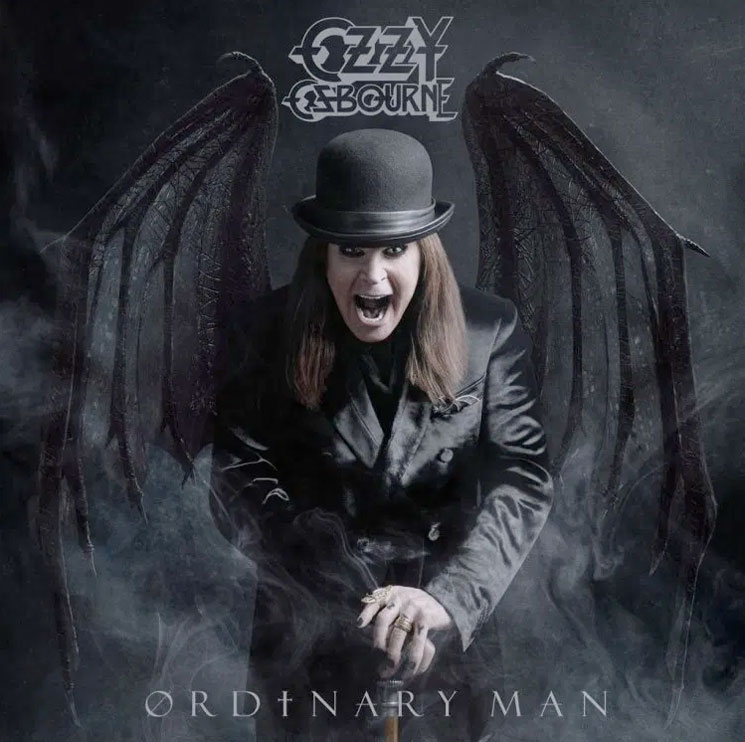In February, legendary rock icon and Black Sabbath founder Ozzy Osbourne – also known by his more theatrical names: The Prince of Darkness and the Godfather of heavy metal – released his twelfth solo album, Ordinary Man.

Commanding a career that began in 1968 under the banner of Black Sabbath, Ozzy, influenced by blues and early rock, birthed heavy metal. Though the genre’s origins are endlessly debated and discussed, it’s reasonable to say that Black Sabbath, in 1970, released one of the first (if not the first) heavy metal album. Like most new art movements, it wasn’t spawned out of thin air, it was born out of the influences that fed the hungriest artists of the era – artists who yearned not only to play the music they loved, but who dared to explore, push the envelope, and test listeners’ limits for experimentation. They were influenced by hard-rock and blues-rock, and the acid-fueled romp of the ‘60s. As Sabbath prodded their instruments in search of new sounds, their distorted amps expunged the flowery, colorful tones that defined and soundtracked the 60s. Just listen to the opening on their self-titled debut: a heavy deluge of rain bucketing down on the paved road as thunder roars in the background over the haunting church bells ringing out, followed by a thick, distorted G power chord. This was dark, creepy stuff, unlike almost anything that was being written and recorded in the era. Judas Priest’s singer, Rob Halford, described it as the “most evil track ever that’s been written in metal.”
A decade later, as drug addiction consumed him, Ozzy was fired from the band he founded, but went on to have one of the most successful solo careers of any frontman. This is no easy feat. Think of your favorite bands; bands with a bevy of hall-of-fame hits (in Sabbath’s case, “Iron Man,” “Paranoid,” “War Pigs,” – and these are all from just one record). Now think of a case where the founder was fired for self-destructive tendencies and, in response, launched a solo career with hits that, at the very least, are on par with their former band’s. Ozzy’s solo debut, Blizzard of Ozz, charted higher than Sabbath’s first record without him, Heaven and Hell, both released in the same year. This would have been like Brian Jones, after being fired from the Rolling Stones, going solo and releasing a record bigger than Sticky Fingers.
Though not officially announced, Ordinary Man is likely the final official studio release from Ozzy – but who knows what the record label will spend years churning out as they comb every inch of his vaults for demos and recordings, years after he’s gone. The album features a slew of collaborations, starting with Ozzy’s newest producer, Andrew Watt. The two began their partnership last year when Ozzy cowrote and appeared on Post Malone’s “Take What You Want,” for his record, Hollywood’s Bleedin, which, at the time, Watt was producing. The much younger Watt, a millennial born around the same time Nirvana released their first record, was steeped in rock and roll from a young age, and is no stranger to working with decorated rock stars; in 2013, he founded his own band with Led Zeppelin descendant, Jason Bonham, and Deep Purple’s Glenn Hughes.
The rest of the roster on Ordinary Man is no slouch either, with some heavy hitters hailing from an era closer to Ozzy’s: Slash and Duff McKagan from Guns N’ Roses, Tom Morello from Rage Against the Machine and Chad Smith from the Red Hot Chili Peppers all make appearances, in addition to Elton John.
With the recent news of a Parkinson’s diagnoses and thereafter cancellation of the No More Tours tour, it can’t help but feel like the end of the road for the esteemed ambassador of heavy metal, who, for generations, quenched teenage thirst for parental disapproval. In fact, Ordinary Man feels, in many ways, like David Bowie’s Blackstar. It is not only the final chapter of a discography, but its lyrics and arrangements bear acknowledgement of the fact. In “Lazarus,” Bowie sang while staring down his despondent cancer diagnoses with not anger or sorrow, but acceptance, “Look up here, I’m in heaven; I’ve got scars that can’t be seen.” Ozzy, in “Ordinary Man,” echoes a similar poignancy, “Don’t forget me as the colors fade; when the lights go down, it’s just an empty stage.” Nearly every song on the album hints at the inevitable.
Ordinary Man is a deeply introspective statement from Ozzy. It strips the façade carefully curated by record labels and marketing gurus to hawk his music at angsty teens, eschewing self-mythologizing for something far more meaningful: realism. In “Holy For Tonight,” when Ozzy sings, “I’m runnin’ out of time; forever I know I’m someone that they won’t remember,” he isn’t the larger-than-life “Prince of Darkness” belting out the chorus from “Crazy Train,” but a weathered man in his later years who has come to terms with his own mortality and is ready to face it head-on.